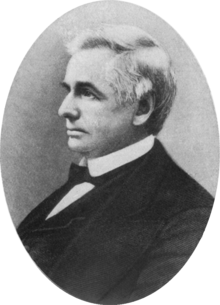|
Aaron Goodrich
Aaron Goodrich (6 July 1807 – 24 June 1887) was an American lawyer, jurist and diplomat. BiographyGoodrich was born in Sempronius, New York, in 1807. In 1815, the family moved to a farm in western New York state, where Aaron attended country school and read law books with enthusiasm. At about age 20, he moved to Stewart County, Tennessee, completed his studies, and began practising the law.[2]  He was a member of the Tennessee House of Representatives from 1847 to 1849. He was appointed as Chief Justice of Minnesota Supreme Court on March 19, 1849, by President Zachary Taylor.[3] He presided over the first court session in Stillwater, Minnesota Territory, in August 1849, deciding 60 cases in six days.[4] However, he failed to see out his four-year term. Several prominent Minnesota attorneys demanded Goodrich be removed for "incompetency, unfitness and improprieties committed on and off the bench",[5] in 1851.[6] After a failed attempt at impeachment, President Millard Fillmore used his executive power to remove Goodrich from office;[7] Goodrich subsequently took the matter to court in an attempt to obtain the salary for the remainder of his term.[3] He was a freemason,[8] and in July 1849, became one of the founding members of the local Masonic Lodge (Saint Paul Lodge Number Three[9]). He was also a unionist, and anti-abolitionist,[10] and a founding member of Minnesota Historical Society[11] and Minnesota Republican Party.[12] Goodrich was a Minnesota delegate to the 1860 Republican National Convention that nominated Abraham Lincoln, but cast his vote for William H. Seward.[13] At Seward's behest,[14] Goodrich was appointed secretary of the United States legation in Brussels, Belgium, by President Lincoln in 1861, remaining there until 1869.[1][10] He died on 24 June 1887, and his body was interred at a graveyard in Genesee County, Michigan. Memorials
Works
References
Sources
|
||||||||||||||||||||||||||||||||||||||
